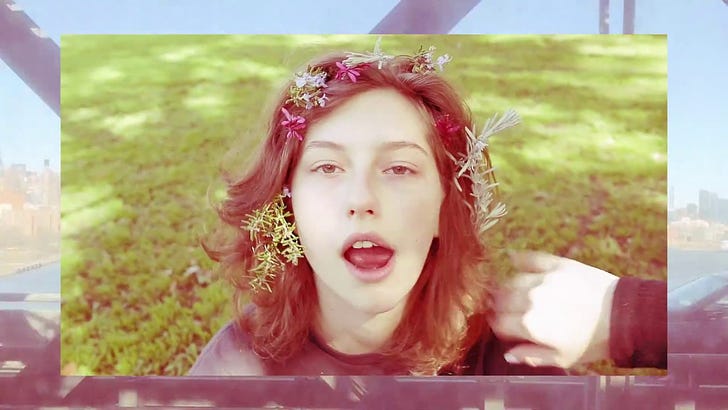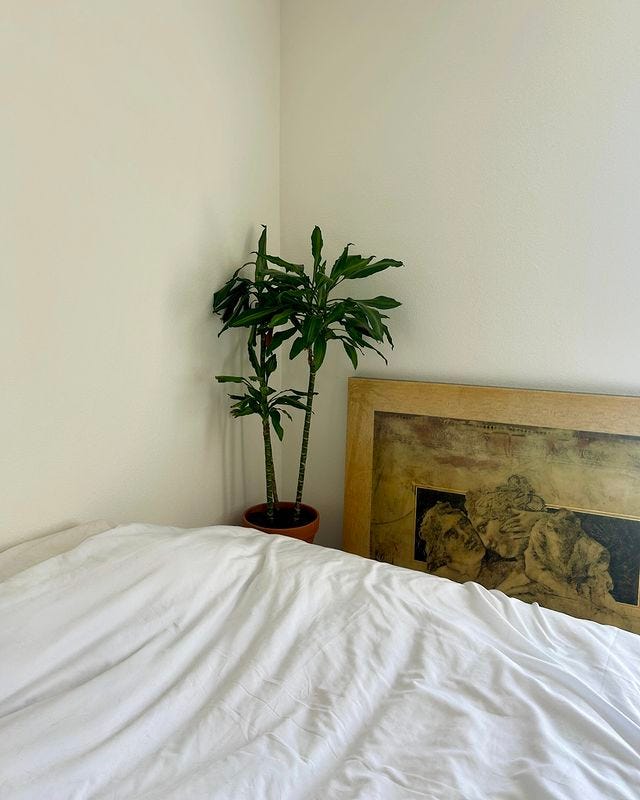Happy Saturday!
Here’s what I have for you today:
Housekeeping
What I’m watching
What I’m listening to
What I’m reading
Quotations
& a disclaimer, again: Things are mostly terrible right now, and the violence is appalling, and there are many people out there who have addressed and do address it better than I ever could, so I’m not getting on a soapbox here—this will just be your weekly round-up featuring what I’ve been reading and thinking through, like usual.
Things to read:
Housekeeping:
Request for responses:
Does anyone have any compartmentalization advice? I had two work nightmares this week, which is stupid and embarrassing, because my job is not hard. Still, I don’t want my day job to enter my unconscious life. During one of them, I ran to Trader Joes during my 30-minute lunch break (in character), but it was crowded, and I ended up getting caught there for two hours, and my boss kept calling me to ask me to do things, but I wasn’t at my computer. Terrible times. How do I make those stop forever?
Song of the week:
Show of the week:
Superstore, which I continue to watch on repeat at some sort of coping mechanism
Purchases of the week:
Thai takeout
A well-reviewed razor, because I’m sick of razor burn
Pride & Prejudice, because I’ve never read it and aspire to
What I’m reading:
Quotations:
Why are we so surprised when we discover that some of the people who have sought the limelight turn out to be unrelatable, haughty or manipulative? Surely you know people who always have to be the center of attention, or only talk about themselves. Well, that’s a lot of actors, frontmen and politicians.
I had to be delusional to a certain extent, because people just didn’t get it, and still don’t. I’ve lost count of how many times I’ve gone into an agency with my portfolio: a box full of glass, burnt Polaroids, photos with bacteria and crystals growing out of them. The agencies are like, “What is this? We can’t sell this.” For so long, I was trying to fit within an industry that didn’t understand or accept what I was doing. In reality, maybe I just didn’t belong in that industry. It took all of my 20s to learn that maybe all along all I wanted to do was my own thing. I’ve gotten to a point where outside validation isn’t worth anything. The artists I most admire were so ahead of their time. It wasn’t until much later in their lives—or even after they died—that they got any kind of recognition.
If you’re communicating something that is sincere to yourself, [an audience] shouldn’t even be your concern. Your audience is the audience of yourself, is an audience of one. The minute you start trying to please everybody else, you’re going to displease yourself, and that is a slippery slope. If you’re being true to yourself, you will always find an audience—even if it’s not today, or tomorrow, or 10 years from now, or 10 years after you die. It’s not for any of us to know. What’s important is that the work is made.
I used to really romanticize the idea of a tortured artist: “I’m in bed, I’m depressed. I want to die, and that’s how I’m going to get inspired.” I also confused obsession with work ethic, with dedication to my craft. But I’ve learned that I actually need to be in contact with the outside world.
Art is not just what we’re doing in the darkroom, or in the studio. It’s how we live our lives—the music we’re listening to, the people we’re hanging out with, the way we walk down the street, the things we see, the challenges we face. All of these things are part of the creative process. If we don’t take the time to explore them, we won’t make anything worthwhile.
There is a very beautiful photo, I actually have it printed in my darkroom, from Duane Michals. To me, it’s the greatest photo ever taken. It’s a black and white photo of a couple in bed, and there’s a caption: “This photograph is my proof. There was that afternoon, when things were still good between us, and she embraced me, and we were so happy. It did happen. She did love me, look, see for yourself!” So much of photography comes back to that: wanting to document something for the sake of memory, because you’re afraid it’s going to run away from you, or you’re going to forget.
When Elijah Muhammad asked James Baldwin what his religion was, [Baldwin] said: “I’m a writer.” I think that’s such a beautiful, perfect answer. Art is capable of salvation, of hope, of all the spiritual things that we have assigned to a god. At the end of the day, it is up to artists. We’re the most sensitive beings. We feel everything so deeply, and we’re going to warn the rest of the world of the dangers, and share the universal experiences of heartbreak and pain and suffering and beauty and joy. I might not believe in God, but I believe in some kind of cosmic thing. Nobody knows why we’re here, why we exist, what comes after this. But if you make work that’s good enough, you’ll live long after you go, and inspire people to pave a path the way you did.
I was just like, this is really weird and really hard. In the past, honestly, eight weeks, my entire life has changed. It’s been really emotional because I’m not just singing pop music, it’s automatically political because I’m gay.
I’ve never not been myself. I’m really glad the persona that I have, the drag version, is still very much me.
I’m just trying my best to honor my feelings, and I hope that my future self is still on that train.
If you saw a random woman on the street, would you yell at her from your car window? Would you harass her in public? Would you be offended if she says no to your time because she has her own time? Would you stalk her family? Would you follow her around? Would you try to dissect her life and bully her online?... I don’t care that this crazy type of behavior comes along with the job, the career field I’ve chosen. That does not make it OK. That doesn’t mean that I want it, that doesn’t mean that I like it… I don’t want whatever the fuck you think you’re supposed to be entitled to whenever you see a celebrity. I don’t give a fuck if you think it’s selfish of me to say no for a photo or for your time or for a hug… It’s weird how people think that you know a person just because you see them online and you listen to the art they make. That’s fucking weird! I’m allowed to say no to creepy behavior, OK?
-Chappell Roan
Poet, as much as it feels like my essence, is still an identity. When I let go of my attachment to identifying as a poet, my life becomes increasingly more poetic.
I’ve never really changed until I truly felt the pain of staying the same.
I am really obsessed with the now, what it means to be a queer person artist trying to love other queer people today.
Making art requires vulnerability and making moves, staking your flag somewhere.
I believe in ass in the chair logistics, in saying you will write for even 30 minutes and staying for the full 30 minutes. I believe that all writers feel like frauds because they’re sitting there in the room and they don’t know what they’re doing but that the main artistic difference between a creatively “blocked” person and Maggie Nelson or Terrance Hayes or [insert your idol here] is that they encounter that feeling of “I don’t know what I’m doing” and they stay there in the room anyway. They don’t leave. Whenever I force myself—through cheap artist’s residency done at an Airbnb with friends or a schedule my partner will judge me for not keeping—to stay are the times when I’ve done my best work.
People’s bodies profoundly shape how the world treats them and how they treat the world.
I wish to speak to you about the wound and the weapon of silence, and the cure of speaking out.
Maybe there was a time when quieting ourselves, when cottoning our tongues, protected us from forces more powerful than ourselves, or seemed to. And maybe there will be times again when humming through our teeth is the least painful path. But too often, our silence is both the wound and the weapon against self.
True bravery is working out who you are while confronting a bleak Tuesday afternoon in mid-February.
Rape was considered a serious crime in the medieval world, says Albrecht Classen, a German studies professor at the University of Arizona. If a rapist was found guilty in court, they were immediately sentenced to death. “It was a crime, a severe sexual crime, and there were consequences: prosecutions and executions,” says Classen, who also wrote a book on the topic, Sexual Violence and Rape in the Middle Ages.




